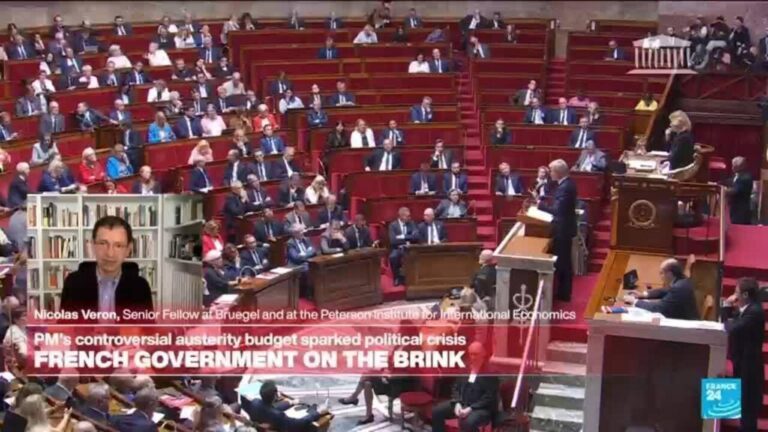As France stands on the brink of a political crisis, Prime Minister François Bayrou finds himself in a precarious position, risking it all on an imminent confidence vote. This decisive moment could tip the scales of power in a nation already grappling with economic challenges and social unrest. The confidence motion, framed as a referendum on Bayrou’s leadership and the government’s direction, has sparked intense debate across political lines. With opposition parties poised to challenge the administration’s stability, the outcome could redefine France’s political landscape, raising questions about governance and the future of the ruling coalition. As the nation holds its breath, the implications of this vote extend far beyond the confines of the National Assembly, potentially reshaping the trajectory of French politics for years to come.
Political Landscape in Turmoil as Confidence Vote Looms
The political arena in France is bracing for a significant upheaval as Prime Minister François Bayrou presses ahead with a high-stakes confidence vote. This pivotal moment comes amidst a backdrop of escalating tensions within the government and public discontent, raising fears of a potential parliamentary crisis. Several key factors are contributing to the growing uncertainty:
- Internal Disputes: Fractures within the ruling coalition have surfaced, with various factions expressing dissatisfaction over policy directions.
- Public Sentiment: A series of recent protests have highlighted widespread discontent among citizens, casting doubt on the government’s legitimacy.
- Economic Challenges: Surging inflation and unemployment figures are adding pressure, with many citizens demanding immediate action.
As Bayrou prepares for the vote, the potential for a parliamentary shake-up looms large. Analysts speculate that the outcomes could reshape the landscape in drastic ways. Consider the possible scenarios:
| Scenario | Potential Outcome |
|---|---|
| Confidence Passed | Stability restored, but heightened scrutiny on policy. |
| Confidence Rejected | Immediate calls for resignation, early elections likely. |
| Coalition Splits | Power vacuum, new alliances could form. |
Bayrou’s Gamble: Strategic Risks and Potential Consequences
Prime Minister François Bayrou’s decision to call for a confidence vote represents a high-stakes maneuver that could redefine the political landscape in France. Amid allegations of government mismanagement and public discontent, Bayrou risks not only his political capital but also the stability of the ruling coalition. The implications of a failed confidence vote would be profound, potentially leading to a reshuffling of leadership or even triggering early elections. Observers are closely monitoring key elements, including:
- Public Sentiment: Rising dissatisfaction among voters may sway the outcome.
- Party Dynamics: Potential fractures within the coalition could emerge if dissent grows.
- Economic Factors: The economic backdrop will heavily influence legislative support.
Should Bayrou’s gamble backfire, France may face a turbulent period characterized by political instability. Early elections could lead to a fragmented parliament, complicating governance. Moreover, such a scenario would create uncertainty that could dampen investor confidence, affecting both the financial markets and economic recovery efforts. A potential scenario analysis illustrates the regions likely to be affected by these shifts:
| Outcome | Potential Consequences |
|---|---|
| Confidence Vote Passed | Stabilization of the ruling party, increased credibility for Bayrou. |
| Confidence Vote Failed | Political turmoil, risk of early elections, possible coalition collapse. |
Public Sentiment and Its Role in France’s Political Stability
The recent developments surrounding Prime Minister François Bayrou’s confidence vote highlight the critical nature of public sentiment in shaping France’s political landscape. As citizens grapple with ongoing economic challenges and security concerns, their perception of governmental effectiveness has become increasingly pivotal. The Prime Minister’s gamble, once seen as a potential stabilizer for his administration, now risks alienating crucial voter blocs who feel unrepresented. This tension underscores the fragile equilibrium between political authority and public opinion, which is especially pronounced in an environment characterized by social unrest and disillusionment with mainstream parties.
French voters are particularly attentive to the following factors:
- Job Security: The lingering effects of unemployment continue to influence voter attitudes.
- Government Accountability: Citizens demand transparency and decisive action from their leaders.
- Social Services Quality: Public healthcare and education systems are under scrutiny as citizens evaluate governmental prospects.
- National Security: Recent events have amplified concerns over safety, impacting trust in political leaders.
To summarize current public sentiment, the following table illustrates key voter concerns in relation to the upcoming confidence vote:
| Concerns | Public Priority (Scale 1-5) |
|---|---|
| Job Security | 4 |
| Government Accountability | 5 |
| Social Services Quality | 3 |
| National Security | 5 |
This snapshot reveals an electorate increasingly demanding proactive measures and genuine engagement from their leaders. Bayrou’s upcoming decision may not only define his political tenure but could also set significant precedents for France’s future governance and stability.
Recommendations for Navigating the Impending Crisis
As political tensions reach a boiling point in France, stakeholders must adopt insightful strategies to effectively navigate the uncertainties ahead. Citizens are advised to remain engaged by closely monitoring announcements from key political figures and participating in community discussions. Such involvement not only fosters awareness but also encourages a collective response to potential changes in governance. To further prepare, individuals can:
- Foster Open Dialogue: Engage with peers about their perspectives on governmental shifts.
- Stay Informed: Follow credible news sources for real-time updates on the situation.
- Participate in Local Meetings: Attend town halls or community forums to voice concerns and seek clarity.
Additionally, businesses and organizations should implement contingency plans that allow adaptability to rapid changes in the political landscape. This proactive approach can help mitigate the impact of any sudden policy shifts or economic uncertainties. Consider establishing:
| Strategy | Description |
|---|---|
| Business Continuity Plans | Create frameworks to maintain operations during crises. |
| Financial Reserves | Maintain a buffer to withstand sudden economic downturns. |
| Policy Monitoring | Regularly assess new policies that may affect operations. |
Wrapping Up
In conclusion, the impending confidence vote facing Prime Minister François Bayrou marks a critical juncture in France’s political landscape. As the nation grapples with pressing issues ranging from economic challenges to social unrest, the outcome of this vote could have far-reaching implications for the French government and its stability. With parties and constituents divided, the tension in the National Assembly underscores the fragility of the current political coalition. Observers will be closely monitoring developments in the coming days, as the actions taken now may redefine the trajectory of French politics for years to come. The stakes are high, and the eyes of a nation are fixed firmly on the parliamentary floor.




